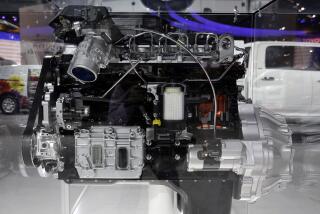Japanese firm to pay $200 million for price fixing
Furukawa Electric Co. agreed to plead guilty and pay a $200 million fine for a price-fixing and bid-rigging conspiracy involving the sale of parts to carmakers.
Three executives, Junichi Funo, Hirotsugu Nagata and Tetsuya Ukai, also agreed to plead guilty and to serve prison time in the U.S. ranging from a year and a day to 18 months, the Justice Department said in a statement today.
The charges are the first stemming from a continuing U.S. antitrust probe of the auto-parts industry, according to the Justice Department. Tokyo-based Furukawa and the three executives agreed to help the department in the investigation, the statement said.
“As a result of this international price-fixing and bid- rigging conspiracy, automobile manufacturers paid noncompetitive and higher prices for parts in cars sold to U.S. consumers,” said Sharis Pozen, acting assistant attorney general in charge of the Justice Department’s Antitrust Division, in the statement.
David Noble, administration manager for Plymouth, Michigan- based American Furukawa Inc., the company’s U.S. unit, declined to comment and said the company would issue a statement tomorrow.
Before the Justice Department’s announcement, Furukawa rose 2.7%, to close at 225 yen on the Tokyo Stock Exchange. The company was part of the conspiracy from January 2000 through at least January of last year, according to the Justice Department.
The three executives, who are Japanese citizens, participated in the scheme from April 2003 through July 2009, the Justice Department said. For a portion of that time, Funo and Nagata engaged in price fixing in the Detroit area, the department said. Funo was Furukawa’s assistant general manager for Honda sales in the U.S., later becoming manager of the company’s Honda sales division in Japan. Nagata was a general manager of sales in the U.S., rising to chief financial officer.
Ukai worked in Japan in Furukawa’s Honda sales division, eventually becoming general manager, according to the department. The company conspired to rig bids and fix prices for wire harnesses and related products, the department said. The harnesses are systems that control a car’s electrical components and circuit boards. The plea agreements require approval by a judge.
More to Read
Inside the business of entertainment
The Wide Shot brings you news, analysis and insights on everything from streaming wars to production — and what it all means for the future.
You may occasionally receive promotional content from the Los Angeles Times.









